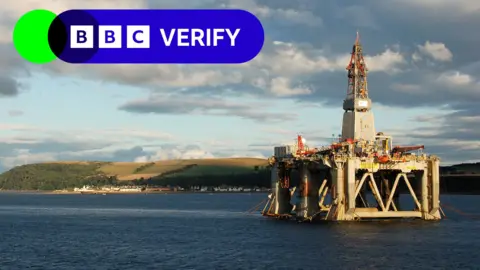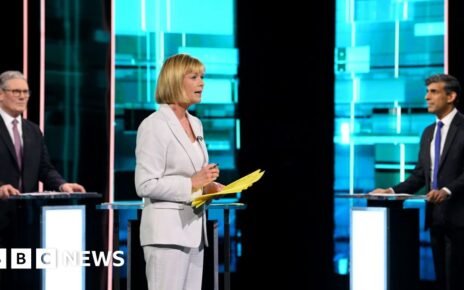[ad_1]
By Verify team, BBC News
 Getty Images
Getty ImagesBy Friday, we’ll know who’s won the general election. But over the course of the campaign, parties in Scotland have made all sorts of claims in an effort to persuade voters to back them. The areas they’ve covered include health care, public spending and the environment.
We examined some of the claims.
The SNP: ‘The arbitrary Tory fiscal rules, adopted by Labour, bake in £18bn of cuts’
The SNP have often repeated the claim a Labour government would cut £18bn from public spending.
This figure came from the Institute for Fiscal Studies think-tank earlier this year.
However, the think tank has since suggested cuts could range from £10bn to £20bn and stressed there is uncertainty around the figure, because no spending plans have been published beyond next year.
Public spending overall is due to rise over the next Parliament and Labour has said it will stick to the broad outlines of the Conservatives’ current spending plans.
But because they have already committed spending to the NHS, defence and new childcare entitlements, other departments look set to lose out.
The extent of the squeeze on “unprotected” areas depends on what choices are made for other public services.
The SNP say this is evidence Labour would continue with Tory “austerity”.
However, an improvement in the economy could make these cuts unnecessary – or the next government could find a way to raise more tax.
Holyrood’s block grant is determined by the overall level of spending on public services at Westminster – which is rising in real terms by 1%.
The Scottish government can also raise income tax to make up for what it sees as a block grant shortfall.
Scottish Conservatives: ‘Labour and the SNP are committed to shutting down the North Sea, rejecting any new licences. That would put 100,000 Scottish jobs at risk’
The Scottish Conservatives want to show themselves as the party of the oil and gas sector but their manifesto repeats a now discredited figure around the future of jobs in the sector.
It claims that Labour and the SNP are putting 100,000 Scottish jobs at risk by not fully backing future exploration licensing – something which the Tories support.
But the reality is that the North Sea is a declining industry and so jobs are continually being lost.
The industry’s own figures show that, at present, it employs about 60,000 people in Scotland, directly and indirectly.
Even when jobs in the wider economy – such as hospitality and retail, whose customers earn their crust from oil – are added in, that figure only rises to 83,000.
Research from Robert Gordon University says that even in the best-case scenario, 33,000 oil and gas jobs will go by the end of the decade in the UK.
In the worst case, that number increases to 60,000.
The difference between the best and worst-case scenarios is 27,000 oil and gas jobs – and that’s across the whole UK, not just Scotland.
Where the Conservatives agree with the other parties is on the need to ensure a fair energy transition for workers.
Scottish Labour: ‘40% of knee and hip operations carried out in Scotland are being paid for privately’
Scottish Labour leader Anas Sarwar’s claim that 40% of hip and knee replacements are being done privately is correct – the figure comes from Public Health Scotland.
In 2022 in Scotland, 11,175 hip and knee operations took place, of which about 4,600 were carried out at private hospitals.
Data from the Private Healthcare Information Network (PHIN) shows that more than 3,000 hip replacements and 1,500 knee replacements were carried out privately last year.
That is either through patients self-funding their care or through insurance claims.
2023 saw record levels of private admissions (up 11% on the previous year).
The Nuffield Trust says in Scotland, there has been an 80% rise over the past five years in people paying out of their own pocket for healthcare.
However, the increase was higher in Wales (up 124%) – where Labour run the devolved administration which controls the health service – and in Northern Ireland (218%).
England – where the health service has been under the control of the Conservatives – saw a rise of 20%.
Relative to its population, England continues to have the highest number of patients going private.
This suggests that wherever you live in the UK, growing numbers of patients are taking matters into their own hands and paying for healthcare to avoid long waits on the NHS.
Labour has said if it were in government it would make use of “spare capacity” in the private sector to cut NHS waiting lists in England (NHS funding would be directed to private providers so it remains free for patients).
But organisations including the Nuffield Trust have questioned whether the overall health budget will increase enough to make the recovery Labour are promising achievable.
Because health is devolved, it is up to the Scottish government to decide how to spend its budget and the SNP – who are in power at Holyrood – say they oppose further privatisation.
Scottish Lib Dems: ‘Last year, 20,000 tonnes of raw sewage was pumped into Scotland’s rivers and beaches’
The Scottish Liberal Democrats claim 20,000 tonnes of “raw sewage” was “pumped into Scotland’s rivers and beaches” last year.
In 2022, there were around 20,000 incidences (rather than tonnes) of sewage being released into Scotland’s rivers and seas.
This happens when heavy rainfall causes sewers to overflow.
The manifesto contains an acknowledgement that the situation in Scotland is not as bad as it is in England, where thousands of cases have been identified of sewage overflowing into rivers on dry days when the sewers should be able to cope.
Although the figures are not directly comparable, experts have told the BBC there are big differences north and south of the border.
For a start, Scotland’s sewers are not under the same pressure from rapid population expansion as England and Wales.
And – crucially – the Victorian sewer system was designed to allow sewage diluted by rainwater to be released on days of severe downpours so that it does not back up into people’s homes.
Monitoring in Scotland is low, covering just 4% of the sewer network compared with 89% in England.
Scottish Water has said that is because significant overflows have never previously been identified as a problem. However, it has begun to install more monitors.
Scotland has also been a decade ahead in requiring new developments to separate household waste water from the rainwater which enters the drains on our streets.
Nevertheless, the Scottish Lib Dems say every outflow should be monitored.

[ad_2]
Source link freeslots dinogame telegram营销




